Global Christianity Collection (7 vols.)
Digital Logos Edition
Overview
The Global Christianity Collection locates the nature and meaning of Christian theology in a twenty-first century, global context. Throughout these seven volumes, experts from diverse cultural and theological backgrounds examine the historical, social and theological implications of Christianity within the framework of globalization. Forward-thinking and timely, the authors consider human rights, postcolonialism, global ethics and other major issues.
The modern world has found itself in an ever-tightening web of economic, social, technological and political interdependence and interaction. With this interdependence comes new opportunity for oppression, abuse, and misunderstanding between the various, sometimes disparate, cultures involved. Christians have been called to positively impact this situation; to deal with the aftermath of colonization and the threat of neo-colonization; to care for the marginalized; to understand the cultural or religious Other; and to bring justice and a concept of common good to the global stage. The Global Christianity Collection offers insight and information on these and other efforts facing Christians in the 21st-century.

- Title: Global Christianity Collection
- Publisher: Continuum International
- Volumes: 7
- Pages: 1,936
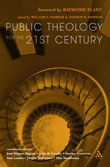
The book is a unique stocktaking by a leading international group of theologians, social scientists and other scholars, on issues facing public theology at the beginning of the 21st century. It combines retrospect and prospect, in that it reflects on the issues and approaches that have characterized public theology in the 20th century, especially its latter half, and attempts to anticipate those which will or should come to the fore in the 21st century, seeking to discern continuities and changes.
Three opening chapters deal with the overall theme of public or political theology, with Jurgen Moltmann giving a critical historical account from the Second World War onwards, Raymond Plant relating such theology to cultural pluralism, and Andrew Morton illustrating it from the work of Duncan Forrester. These are followed by pairs of contributions relating public theology to more specific topics: History; Technology and Creation; Globalization; Spirituality; Punishment and Forgiveness; Medical Ethics; Tolerance and Human Rights; Social Exclusion and Equality.
William Storrar is Professor of Christian Ethics and Practical Theology, and Director of the Centre for Theology and Public Issues, in the University of Edinburgh.
Dr. Andrew R. Morton is Honorary Fellow of the Faculty of Divinity of the University of Edinburgh.
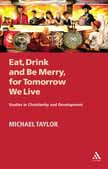
This volume is a collection of essays by a world authority of Christianity and global ethics. They are intellectually rigorous, but written in non-technical language for the thoughtful reader. They deal with the exhaustion of the Western Christian tradition and its need to “cross boundaries” if it is to find renewal; why the North should be interested in development; how to respond to highly divergent views about the effects of the global economy; advice to Christian campaigners and demonstrators; differences and similarities between those who set out to reform the global economy and those who reject it wholesale; ways of doing social theology or social ethics; and some of the challenges made by faith traditions in the “South” to the mainstream development tradition. Many recurring themes in the book arise from the continuing tradition of Christian Realism, requiring us to take full of account of the worst as well as the best in human nature.
Michael Taylor not only explores issues that have been neglected from an interfaith perspective, but also engages with development practitioners and tries to contribute to the ongoing debate as to how poverty reduction and human development should be tackled.
Michael Taylor, a Baptist Minister, was previously Director of Christian Aid, President of the Jubilee 2000 UK Debt Campaign, and Director of the World Faiths Development Dialogue. He is currently Emeritus Professor of Social Theology in the University of Birmingham.
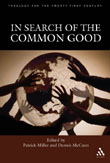
This collection focuses on the meaning of the common good and what resources Christian theology, biblical studies, and ethics might contribute to our understanding of it. The rationale for the discussion in the volume is ultimately theological. Whether under the formal rubric of “common good” discourse or not, the meaning of a commitment to community and the duties and claims of the individual related to the community have never been more pressing concerns. One must recognize that the thinking about the common good is intrinsic to the very character of Christian faith and the ethos it invokes.
The biblical vision is in a most profound way a vision of the common good. Whether expressed in notions of justice and mercy, the care of the weak, covenantal living, or the new Jerusalem, the meaning of being human and living with the neighbor are so intrinsically bound together that there is no escaping involvement in the search for the common good in our time.
Patrick Miller is Professor of Old Testament Theology in the Department of Biblical Studies at Princeton Theological Seminary.
Dennis P. McCann is the Alston Professor of Bible and Religion at Agnes Scott College in Decatur, GA. He is the author of Christian Realism and Liberation Theology: Practical Theologies in Creative Conflict and, along with Max Stackhouse and Shirley Roels, the coauthor of On Moral Business: Classical and Contemporary Resources for Ethics and Economics. McCann also served as Executive Director of the Society of Christian Ethics (1996-2001).
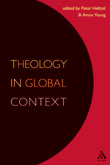
Robert Cummings Neville has been a consistent advocate for the necessity of global theology. Early in his career, he realized that the philosophical framework of the West alone was inadequate for a truly global theology. Since then, he has sought to develop theology creatively and responsibly within the world context. The original essays in the volume participate in and model the kind of dialogical, global theology embodied in Neville’s work.
Amos Yong is the Associate Professor of Theology at Bethel College and the author of Beyond the Impasse: Toward a Pneumatological Theology of Religions.
Peter Heltzel is Visiting Assistant Professor of Theology at New York Theological Seminary.
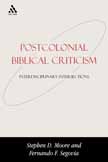
Postcolonial studies have recently made significant inroads into biblical studies, giving rise to numerous conference papers, articles, essays and books. Postcolonial Biblical Criticism is an in-depth and multifaceted introduction to this emerging field. It probes postcolonial biblical criticism from a number of different but interrelated angles in order to bring it into as sharp a focus as possible, so that its promise - and potential pitfalls - can be better appreciated.
This volume carefully positions postcolonial biblical criticism in relation to other important political and theoretical currents in contemporary biblical studies: feminism, racial/ethnic studies, poststructuralism, and Marxism. Alternating between hermeneutical and exegetical reflection, the essays cumulatively isolate and evaluate the definitive features of postcolonial biblical criticism. Such a mapping of postcolonial biblical criticism as a whole has never before been undertaken in such explicit and detailed terms. The contributors include Roland Boer, Laura E. Donaldson, David Jobling, Tat-siong Benny Liew, Stephen D. Moore and Fernando F. Segovia.
Fernando F. Segovia is Professor of New Testament and Early Christianity, Vanderbilt University, Nashville, Tennessee.
Stephen Moore is Professor of New Testament, Drew University, New Jersey.
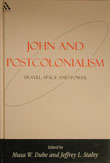
An exciting collection of essays connecting postcolonialism and the Gospel of John, written by a group of international scholars, both established and new, from Hispanic, African, Jewish, Chinese, Korean and African-American backgrounds. It explores important topics such as the appropriation of John in settler communities of the United States and Canada, and the use of John in the colonization of Africa, Asia, Latin America and New Zealand. The interpreters represent communities of borderland dwellers, women in colonized settings, minority ethnic groups within colonized centers and others.
In an era of rapid globalization, increased travel, rising diasporic communities and neocolonialism, it is crucial that biblical scholars find ways to address this world with critical skill and sensitivity. This book fills this need.
Musa Dube is affiliated to the University of Botswana and member of the Society of Biblical Literature.
Jeffrey L. Staley attended Wheaton College, Fuller Theological Seminary, and the Graduate Theological Seminary in Berkeley. He teaches in the Department of Theology and Religious Studies at Seattle University.
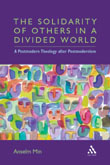
The thesis of this book is quite simple. The globalization of the world brings together different groups into common space and produces a twofold dialectic, the dialectic of differentiation in which we are made increasingly aware of differences in nationality, culture, religion, ethnicity, gender, class, and language, and the dialectic of interdependence in which we are compelled to find a way of living together despite our differences. The central challenge of the globalizing world is how to manage and transform this twofold, antithetical dialectic of simultaneous differentiation and interdependence into a solidarity of others, the mutual solidarity of those who are different.
The Christian tradition provides abundant resources worth retrieving for this theological purpose. Using the paradigm of solidarity of others as the central theme of theology, it is possible and appropriate to renew the doctrine of the Holy Spirit as the Spirit of solidarity and recapture the inspiring and illuminating potential of the classical, authentically Christian metaphor of the body of Christ as embodiment of this solidarity.
Anselm Min is Professor of Religion at Claremont Graduate University and the author of Dialectic of Salvation: Issues in Theology of Liberation.